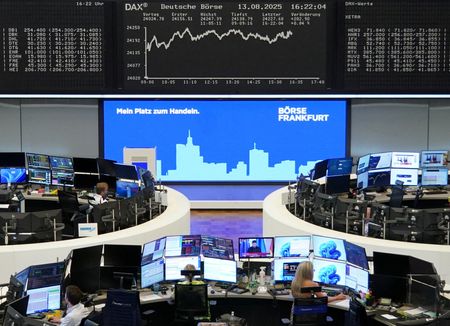FRANKFURT (Reuters) -Euro zone industrial output dipped more than expected in June even as overall economic growth held up in the second quarter, challenging views that the 20 nation currency union remains resilient to the fallout from a global trade war.
Industrial output fell 1.3% on the month in June, driven by a big dip in Germany and weak consumer goods production, underperforming expectations for a 1.0% fall, data from Eurostat showed on Thursday.
Adding to the negative surprise, Eurostat also revised its output growth estimate for May to 1.1% from 1.7%, suggesting that the underlying trend is weaker than thought.
Meanwhile GDP grew by 0.1% on the quarter, in line with a preliminary estimate, and employment rose just 0.1% on the quarter, in line with expectations in a Reuters poll, but below the 0.2% in the previous three months.
A recent string of relatively upbeat indicators from purchasing managers (PMI) data to the European Commission’s sentiment reading have fuelled a narrative that consumption is keeping the bloc resilient to trade tensions, but more recent numbers, like industrial orders and a key sentiment reading from Germany, have challenged this view.
Still, investors continue to bet on a modest upturn on the premise that a recent EU trade deal with the U.S. provides much needed certainty and Germany’s plans to sharply boost budget spending will support growth.
This is why financial investors think the ECB may be done cutting interest rates and policymakers will sit out a temporary dip in inflation below the 2% target, as price pressures over the medium term are already building up.
Growth is unlikely to take off, however, and the euro zone is facing modest expansion of only around 1% a year in the coming years, trailing other major economies, given structural inefficiencies.
Compared to a year earlier, second quarter economic growth was 1.4%, a figure that is boosted by a one-off demand surge before U.S. tariffs took effect. This figure is now seen slowing steadily before picking up in 2026.
The monthly industrial fall was driven by a 2.3% drop in Germany and an 11.3% fall in Ireland, a figure that is unlikely to concern many, since Irish data is exceptionally volatile due to activity among big multinational companies, mostly in pharmaceuticals, based there for tax purposes.
Industry figures showed that besides energy production, every sector took a dip last month, led by a 4.7% fall in non-durable consumer goods and a 2.2% fall in capital goods production.
(Reporting by Balazs Koranyi; Editing by Toby Chopra)










